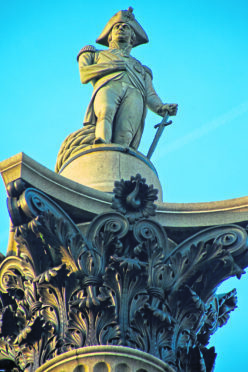Admiral Viscount Nelson was master of the art of savage, close-fought, naval combat which brought his crowning glory at Trafalgar – and death at 47 – but he was often all at sea with the daily trials and tribulations which are familiar to many in public life today.
Tomorrow is the 260th anniversary of the birth of a national hero who towers over Trafalgar Square as a constant reminder of his stunning victory, and how he stood between Britain and a Napoleonic invasion.
For many north of the border, the Battle of Trafalgar was a triumph made in Scotland.
Scots sailors were the backbone of the crews who helped Nelson forge an incredible new benchmark for swashbuckling heroism in the line of duty, which shaped the British military in following centuries.
There were also five Scots captains among his “Band of Brothers”, as he called his most trusted battle-hardened skippers, who led his fleet into the inferno – carried along by Dundee jute used for the huge billowing sails, with timber which made the ships and iron and charcoal for cannons and gunpowder all coming from Scotland.
“I wince at today’s politicians accusing opponents of playing politics”
Among the Band of Brothers was Captain George Duff, 42, from Banff, commanding “Mars”, who was killed by a direct cannonball hit from his opponent in early exchanges, the French ship “Fougueux”.
Nelson faced many tough personal and political battles.
He protested that his reputation was tarnished by political game-playing – driven by envy (in his opinion), but also by his legendary insubordination to follow his own instincts and penchant for sailing over the heads of his bosses. Then, as now, being a superstar opened doors to ministers and royalty.
Critics accused him of failing to learn personal and political lessons, and lampooned him over his “scandalous” love life which “affected the balance of his mind”. He was a married man, but lived with his lover Lady Emma Hamilton and her husband in the same house. Today’s tabloids and social media would have gorged themselves on this lascivious feast.
I wince at today’s politicians accusing opponents of playing politics. It’s like blaming the other team for playing better football, or a poker player for hiding something.
Posturing, point-scoring and rhetoric are part of the game they all play.
Political rhetoric is a powerful tool, especially when repeating a questionable point so often that people actually believe it. As 16th Century “father of modern political science” Niccolo Machiavelli observed, sometimes it is more effective to appear to be paying careful attention to the grievances of your followers, and reflecting their views or prejudices, even if you are not actually doing anything to solve them.
I don’t know how Education Secretary John Swinney kept a straight face when he accused others of “playing politics” last week. He was being pulverised over much-reviled P1 testing for four and five-year-olds in Scottish schools.
There was almost universal condemnation over claims that children were reduced to tears – and maybe some teachers too. Teachers say P1 testing is pointless, time-consuming and stressful.
Back to the drawing board? It looks that way, but at the risk of being torn to bits by those looking down from the self-rightuous moral high ground, I have the temerity to ask: “What is wrong with testing four- to five year-olds?”
Surely some form of formal assessment is a commonsense process for children at such a tender and receptive age. They are like clay waiting to be moulded, as their characters and attitudes to future learning are shaped for life.
It appears that test delivery and content are the sticking points.
A P1 test that relates in an engaging way – with fun and laughter instead of tears – while harvesting important learning information would seem the best way forward. The last thing they should do is label some of them as failures so early in life.
Sooner or later, someone is bound to say “lessons will be learned” over any mistakes in this process. I hope they don’t as this is another awful phrase that has slipped seamlessly into the lexicon of public life to deflect blame for everything from child-abuse scandals to major IT breaches of confidentiality, from avoidable industrial tragedies to cronyism in public institutions, and could easily be applied to the Scottish Government oil-crisis task force that did not seem to achieve anything tangible.
“Lessons will be learned” these days is often a convenient cloak for the complacent or inept to hide behind.
The obvious question is whether failure could have been avoided in the first place? The answer is usually yes.
>> Keep up to date with the latest news with The P&J newsletter
“With hindsight…” is a well-worn and tarnished excuse, but “we were seriously lacking in the foresight we are paid to display in the first place” is a phrase that rarely sees the light of day.
Machiavelli offered cautionary, defensive advice to leaders on this subject, too: “You must be a fox to spot the traps”.
Perhaps we need the strong, decisive “Nelson touch” in these impoverished days of political leadership that lacks any charisma or flair.
Let us leave the final words to the great man himself.
“The generality of mankind judge from what is now, and not what was then”, Nelson once confided to the Duke of Clarence after being engulfed by a new political storm over his judgment.
It remains sound advice today for anyone navigating through public life with a hard-won reputation to protect.











